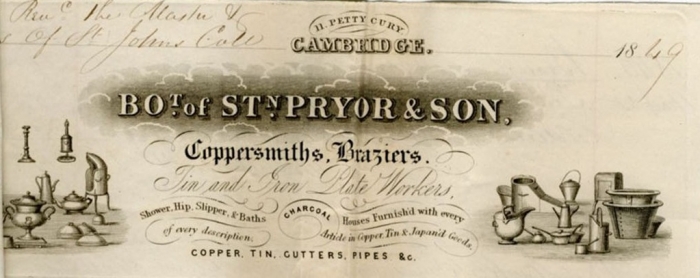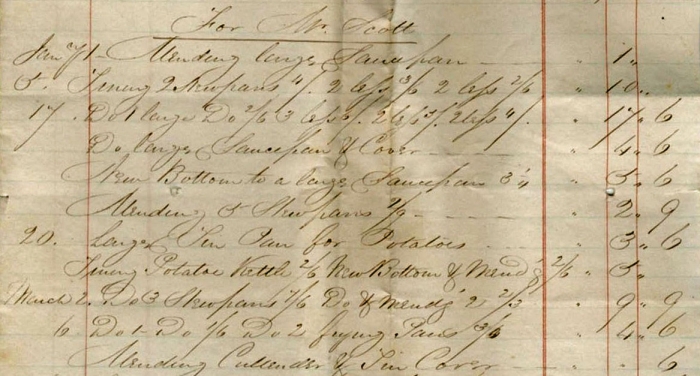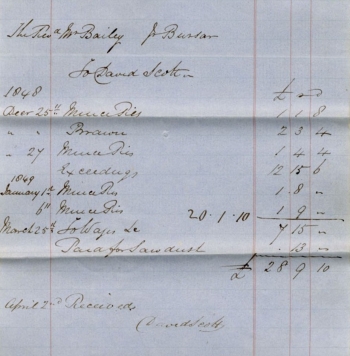David James Scott (1800-1861): the last Scholars' Cook
Until David Scott's death in 1861, the College employed two cooks as part of a large and relatively unruly body of catering staff. During this mid-century period Owen J. Jones held the position of College Cook and Scott worked alongside him as the Scholars' or Junior Cook.
The Junior Bursar's accounts in the College Archives (there were three stand-out Junior Bursars in Scott's time: Basil Williams, 1850-4, Simeon Hiley, 1854-60, and Churchill Babington, 1860-70) contain numerous records of Scott's activity as a Scholars' Cook. The bill photographed below is from Pyor & Son, a coppersmith and brazier carrying out various jobs for the College. Kitchen work is separated between Owen J. Jones and David Scott and signed off by each. This section of the bill is headed 'For Mr Scott' and includes fees for a 'Large Tin Pan for Potatoes' and for 'Mending Cullender & Tin Cover'. Scott signs off numerous supplies to the kitchens: grocery bills are typically split between 'Jones's' and 'Scott's' larders.
'For Mr Scott': Pryor & Son kitchen repair bill 1849
The College had a long tradition of income supplements for domestic staff through various perquisites and charges from undergraduates. It was even rumoured that the St John's College Cook raked in so much from the students demands for extravagant private meals that he offered to loan Trinity College £60,000 towards the building of Whewell's Court (SJC: A History, 267).
As Malcolm Underwood notes in The Eagle (LXXII, 1990):
In St John's at various times between 1769 and 1880 this scheme of management came under a critical scrutiny which resulted in far-reaching changes to wages and service. The pioneer in criticism and reform was William Samuel Powell, master 1765-75, who also began the systematic classification and recording of students' performance in their college exams' (10).
In relation to the kitchens in particular, the College Archives hold a 'Report of Income in College Levants' (drawn up in the early-mid 1850s), which rather bluntly states: 'The service of the Hall and Kitchen as at present conducted appears to us to be extravagantly expensive and at the same time not efficient or satisfactory' (5). Indeed, a committee on service was appointed in 1854 to look into these issues. The committee's report explicitly 'criticised the service of the scholars' cook, which involved a whole sub-staff of foreman, account-keeper, and housekeeper...' (Underwood, 14).
Another Committee Report held in the College archives discusses the details of abolishing the post of Scholars' Cook. The report is dated 1858, which indicates that perhaps David Scott's health was in decline at the time and they were assuming the post would come to a natural end. Indeed, as early as 1854, Scott's son, Henry Shippey Scott, appears as signatory for Junior Bursar receipts, and also signs for his father after his death in 1861. Henry S. Scott is also listed as 'cook' at the College in the 1851 and 1861 census', perhaps taking on the workload of his ageing father but presumably not continuing for long after the post was discontinued.
Mince pies etc.: receipt from Junior Bursar 1848-9
*******
Further reading:
Peter Linehan ed. St John's College: A History, 257-74.
Malcolm Underwood, 'Service and Nineteenth Century Critics in St John's', The Eagle LXXII (1990), 9-19.



